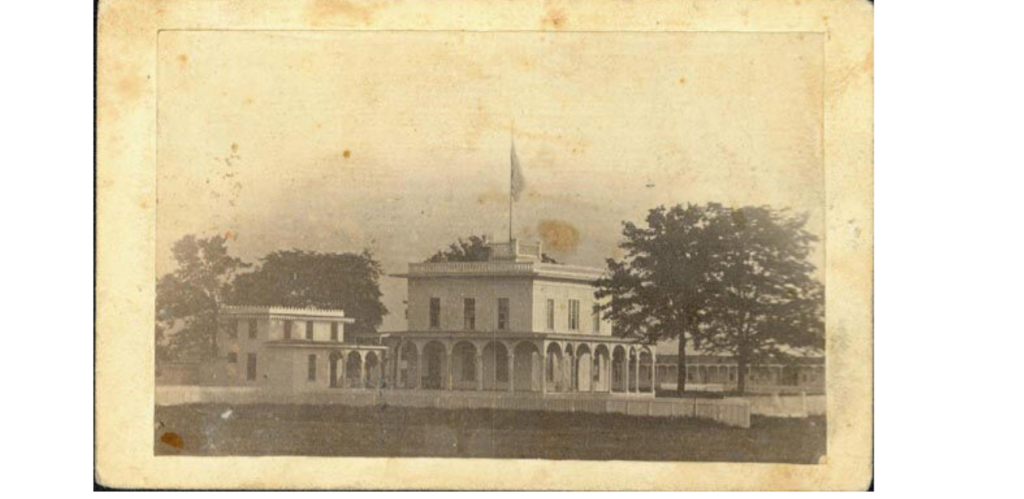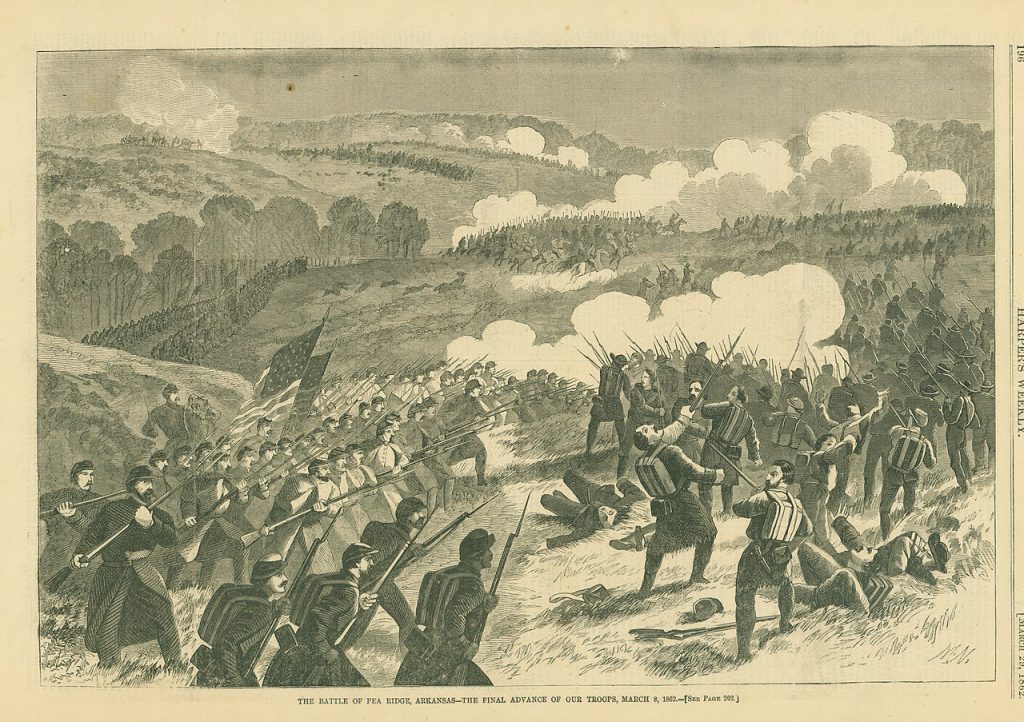Research Arsenal Spotlight 26: David Patten 35th Illinois Infantry
David Patten was born in 1838 and lived in Illinois. When war broke out, he enlisted in G.A. Smith’s Independent Regiment, which was later designated as the 35th Illinois Infantry. The regiment was organized by Colonel Gustavus A. Smith in Decatur, Illinois.
David Patten was mustered in as a private in Company B, 35th Illinois Infantry on August 28, 1861. His first letter in our Research Arsenal collection was written on September 13, 1861, when the regiment was still known as Col. G.A. Smith’s Regiment, and was currently stationed at Benton Barracks in St. Louis, Missouri. In it, David Patten reveals that sickness has already taken hold of the regiment, writing, “There is a good many sick here at this time with various diseases.”
In the same letter, David Patten also revealed that the men had yet to receive their uniforms.
“We have not got all our uniforms yet. We have got two shirts and two pairs of socks, one pair of shoes, and two pairs of drawers and cap. I don’t know when we will get the rest.”
David Patten in Missouri

The 35th Illinois Infantry spent much of the early war fighting in Missouri against the forces of Confederate General Sterling Price. In a letter dated October 21, 1861, David Patten wrote about the regiment’s pursuit of General Price while camped along the south branch of the Osage River.
“We are camped here for awhile to rest. We are going on in the morning south after Price and Jackson. They are running but they are [trapped] since they cant get out without fighting. We camped on the same ground Saturday that they did one week ago. They are going south as fast as they can but there is about twenty thousand California rangers that will meet them about Arkansas. Our forces is about forty-seven thousand [and] twenty-five pieces of cannon. I think we will catch them sometime or rather, if we do, it will be all day with them. There is enough of us to take them right along without any trouble.”
He closed with the rather optimistic assessment that, “Three of four weeks will bring the war to a close in Missouri. Then Kentucky and Arkansas will be the fighting ground next.”
In an undated letter written sometime in early 1862, David Patten revealed that the fighting in Missouri was looking a bit grimmer for the Union, saying:
“The Unions folks of Missouri are moving out as fast as they can following the soldiers. [They are] going to Illinois, leaving their homes and taking what they can haul or drive. There is one thing more I must say—it is the poorest county I ever was in. The timber is all brush and the soil is flint rock and they lay as thick as one can lay beside another and there is no end to the depth. The water is good where there is water, but that is scarce.”
On January 9, 1862, David Patten wrote about a trip he took to see the “Mammoth Cave of Missouri,” not to be confused with the more well-known Mammoth Cave in Kentucky. It’s not known which cave this passage referred to, as there are many small caves in the area near Rolla where David Patten and the 35th Illinois Infantry were camped.
“Me and three others were out about 3 miles yesterday to the Mammoth Cave of Missouri. When we got there and went into the entrance, it looked like the entrance of the wet cave in Ohio. For a moment, it seemed to me that I was in Ohio. The entrance of the cave is larger than that of the wet cave in Ohio. There is a nice stream of water running through the center of the cave. We was in about half a mile. We could a went further but our candle was not sufficient to last so we had to go back. The wet cave is no comparison to these Here, all kinds of petrified stone and different apartments on both sides of the stream. We found the bones of an Indian in one hole that we was in. I suppose they had been carried there by some animals. We shot a few rounds of lead at the mark with our revolvers and took a snort of dog leg. I then left for camp.”
Continued Fighting by the 35th Illinois Infantry

On March 7-8, 1862, the 35th Illinois Infantry fought at the Battle of Pea Ridge, in Missouri. This pivotal battle in which Union forces were able to hold back the Confederate army gave them control over most of Missouri and the northern part of Arkansas.
During the Battle of Pea Ridge, the lieutenant colonel of the 35th Illinois Infantry, William P. Chandler, was captured. One March 23, 1862, David Patten wrote that the lieutenant colonel had recently been exchanged and returned to them:
“We are in Missouri now about 10 miles from the Arkansas line. Our lieutenant colonel was exchanged yesterday and is in command of the regiment now. He said rebels treated him like a gentlemen. Their force is at Fort Smith, Arkansas. The first day we fought 12,000 of the rebels and [we] only had about 2,000. They said we fought like devils. Seven of their regiments was Mississippians and Louisianans. We found a good many arms that they had hid. I don’t know where we would go yet.”
By June 7, 1862, David Patten and the 35th Illinois Infantry were in Mississippi. While they didn’t participate directly in the Siege of Corinth, David Patten still observed some of the aftermath:
“We went to Corinth and saw them skirmish some and stayed there till the rebels evacuated the place, then followed them south. We are about 25 miles from Corinth now, close to the rebels. You have heard about the arms that our men got and destroyed. And the prisoners—they don’t amount to much. We have papers here up to the 3d of this month. They tell all about our movements and about McClellan fighting the rebels at Richmond, Virginia—-that is the two first days, but no further.”
David Patten wrote again on July 29, 1862 revealing that his current duties were light and that he hoped to become a sergeant.
“But my duty is not very hard now. All I have to do is to draw rations from the commissary for the company and divide them out to the messes, drill and go on dress parade and do some fatigue duty at times. I don’t have to stand guard at all. There will be a sergeant to elect in the company before long. I will stand a chance to get that place so I will wait for this time.”
By October, 1862, continued fighting, including the recent battle at Perryville, Kentucky, left David Patten tired of the war and desiring to come home.
“We had a fight with the rebels at Perryville, Kentucky, on the 17 of this month. There was a good many killed and wounded on both sides. I have seen no official report but I seen a good many dead here. We had a fight with them yesterday. We are resting today but I don’t know how long we will rest. We are nearly wore out a running and fighting the rebels. If I had a got pay at Louisville, I would a come home.”
Declining Health
While David Patten had battled sickness throughout his time in the 35th Illinois Infantry, his health seemed to decline more aggressively in 1863. The poor conditions and meagre rations were taking their toll as he revealed in a letter dated January 19, 1863:
“I am not very well at this time. I have felt bad ever since the Battle [of Stone River] It was enough to kill the devil to lay out in the rain and mud with no fire and half enough to eat as long as we did. But I am thankful to come off as well as I did.”
As with the letter written last October, David Patten continued to wish to go home.
“I would get my likeness taken if I had a chance but there is a better chance of getting a scalp taken than a picture now. I am homesick now more so than I ever was. I long to see the time when I can come home and bid adieu to this bloody war. I will be 25 years old tomorrow and 17 months and 16 days to serve yet in this war.”
The final letter by David Patten in our collection was written on November 1, 1863 beginning with:
“I now take my pen up to write you a few lines this Sabbath morning to inform you that I am still alive but not in good health.”
Though he went on to assure his family that he was still able to do duty, David Patten also requested that they send him some desperately needed food:
“I want to know if you can send me some butter and some molasses and a little buckwheat for us. One gallon of buckwheat flour would do me a good while and a gallon or so of molasses and [illegible] pounds of butter and some kind of fruit. I never was so near starved in all my life than I am now.”
Sadly, David Patten passed away just a month after this last letter was sent on December 12, 1863.
We’d like to give a special thank you to William Griffing of Spared & Shared for his work in transcribing and sharing these documents.
To read more of David Patten’s letters or access thousands of other Civil War documents, sign up for a Research Arsenal membership.
If you enjoyed this feature, check out some of our other articles like David Poak of the 30th Illinois Infantry and Silas Leach of the 52nd Pennsylvania Infantry Regimental Band.

